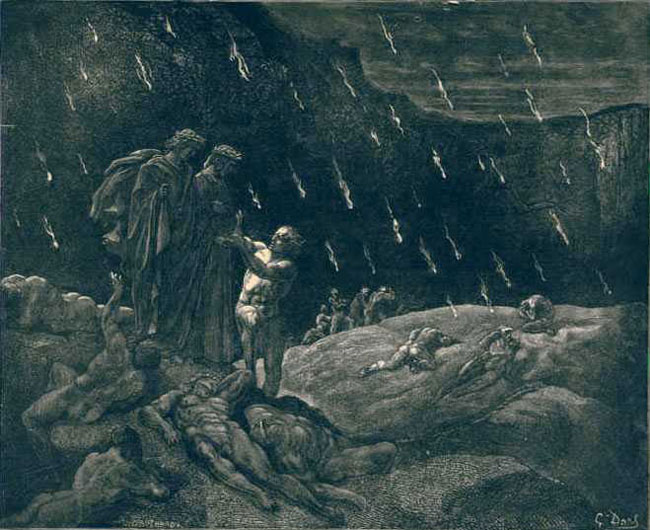
There is a telling stanza in this canto that brings the reader back to the beginning. Dante exclaims while walking through the realm of sodomites that he is quite removed from the forest of the suicides. It was translated as "by now we were so distant from the wood that I should not have made it out where it was-not even if i turned around to look" This may just be Dante situating the reader geographically, but i think there may be more. The language in Italian, while obviously different, still carries familiar echoes. It also doesn't seem like much of a coincidence that this line is spoken at almost the exact center of Inferno. So halfway through the 1st leg of a journey that he begins halfway through his life, Dante stops to inform his reader just how far he has come. The obscurity of the dark forest of suicides stands merely as a metaphor for the larger distance both Dante and the readers have taken. We are very, very far from Kansas at this point. Maybe many less invested and adventurous readers have abandoned the journey. But those of us who stuck around are given pause to possibly reflect before resuming the descent.
The picture above. Well, it's one of the famous Dore illustrations he did for the longfellow translation of the Divine Comedy. It shows the pivotal meeting between Dante and his guardian/teacher/mentor Brunetto Latini. Despite his damnation, Dante speaks of him with great affection, praising him for his "kind paternital image" and speaks of his eternal gratitude to Latini for teaching him to be a better poet and man. There is such tenderness in Dante's words that commentators have asked the obvious modern question of whether the relationship between Dante and Latini was deeper than a chaste mentor/protege relationship. I am not one to speculate on these matters, although it does change the readers perception if one entertains this (and not just for this canto, but the epic in general, especially given the specificity of the dark forest motiff reoccurance in this specific canto). But it is, regardless of the larger implications, a very sweet moment between teacher and student, and considering how deep into the torments of Inferno we are, I'll take it.